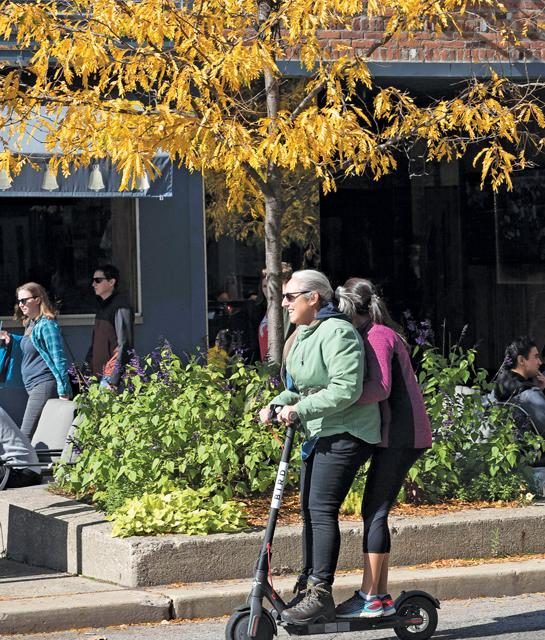One lecturer at the School of Information says that if she’s running late, she’ll sometimes take one of the electric scooters from her home near the Ann Arbor Y and “Bird up” to North Quad. She doesn’t have to hurry (or sweat), and it costs her about $5, instead of $20 or so to drive and park.
Bird Rides founder Travis VanderZanden, a veteran of Lyft and Uber, is using Uber’s “try and stop me” model. Bird moves into cities without warning, drops off hundreds of Chinese-made scooters, and counts on people to figure out how to use them. The idea is to build a base of enthusiastic riders before local governments can step in with regulation. —
The city responded quickly. “Residents should be aware that operating or leaving these scooters on City sidewalks or leaving them in City streets is prohibited and subjects violators to citation by the City, penalties, and City removal of any left scooters,” it warned in an email. Indeed, dozens of Birds obstructing sidewalks were scooped up and hauled off to the Wheeler Service Center on Ellsworth.
Once you download the Bird app and enter your payment information, you can find and unlock a Bird with your phone. Push two or three times with your foot to get going, like a manual scooter, then control your speed with the throttle button by your right thumb. Squeeze the brake with your left hand to slow down. Park it by a bike rack, if available, or anywhere. Your credit card is charged $1 plus 15 cents per mile ridden.
Though Bird tells riders to wear helmets, it’s BYO, so almost none do. And there’s been plenty of joyriding, often illegally on sidewalks. But the Birds shut down at night, so at least there’s no drunken jousting on South U. And many riders seem to love them. After word of the confiscations got out, one tweeted, “I know why the caged bird sings.”
Observer contributor Jim Manheim uses Birds for his forays into Detroit. He parks his car near a nest outside McShane’s Pub on the corner of Michigan and Trumbull and Birds into town, saving “a good deal on street parking.” When the batteries run down, freelance “chargers” pick them up, charge them, and return them to their nests. Manheim says he talked to a Detroit charger who said he was “clearing $700–$900 a week” doing that.
In mid-October, the company hadn’t yet figured out what to do about the ones in custody in Ann Arbor. “We’ve confiscated thirty-five scooters for some kind of hazard or obstruction,” says AAPD traffic division sergeant Bill Clock. The Birds are still “caged” at the Wheeler Center, Clock says, but they are not impounded—it’s just that no one has picked them up.
“We’ve gotten a couple of calls from residents” complaining about scooters left on private property, Clock says. “I did get contacted from a rep of Bird during the first football game day in early September,” and city administrators are in conversations with the company.
No one has been ticketed for riding a scooter in the city yet, but Clock says if an officer sees a “Birder” riding recklessly and putting people at risk, “then, yeah, we would issue a ticket. We want to keep everyone safe.”
Will the Birds migrate when the snow flies? Not necessarily, a company spokesperson emails: “While some Birds may fly South during harsher winters, we recently unveiled Bird Zero—the industry’s first rugged e-scooter.”
It gives a whole new meaning to “snowbird.”


